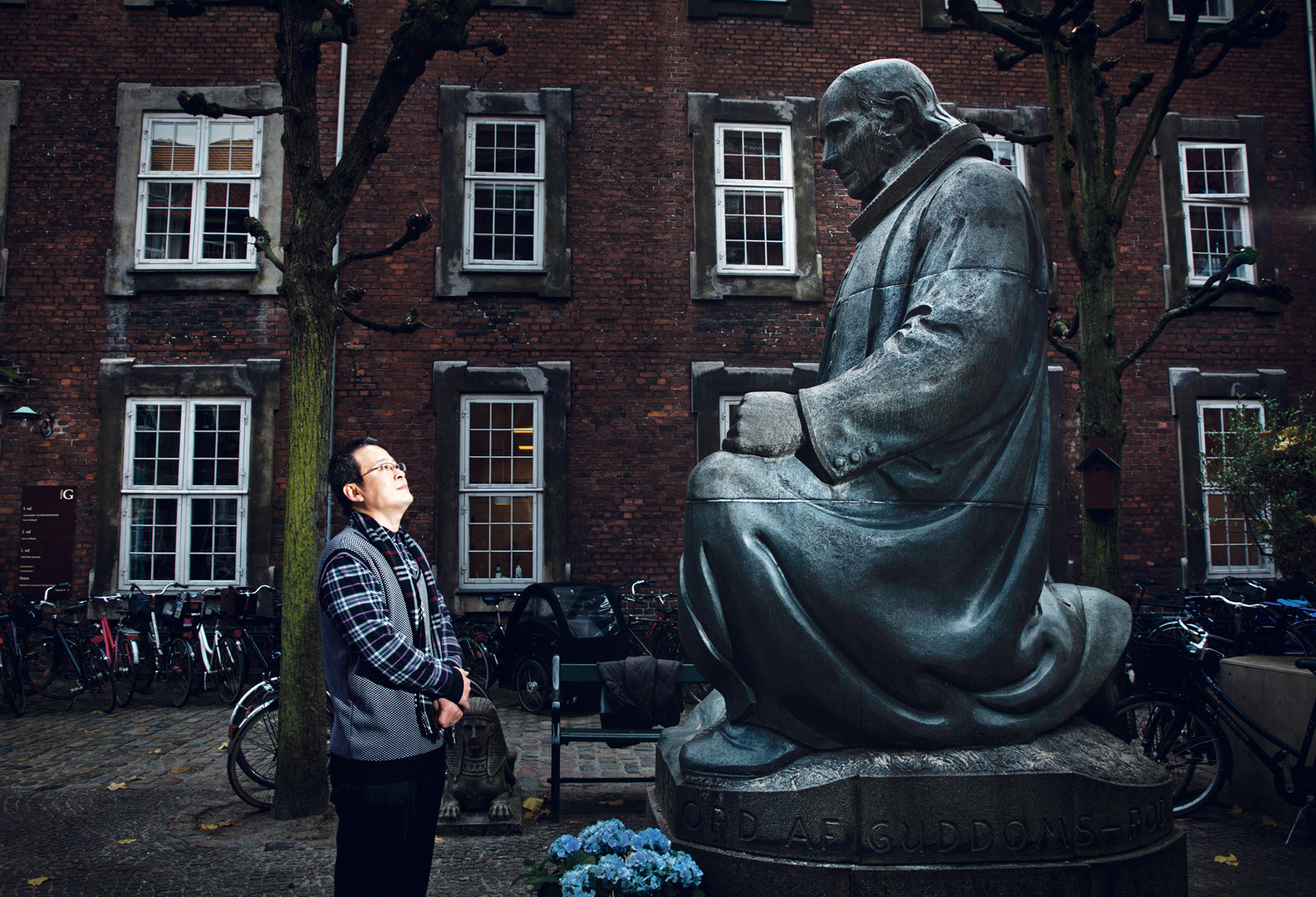Danish spiritual icon to inspire Chinese Christians
Wen Ge from China is fascinated by the Danish church reformer and educator N.F.S. Grundtvig, who he has been studying for almost two years at Aarhus University.

The ninth and final stroke of the City Hall clock in Copenhagen is still reverberating in the air as Wen Ge pushes his bike through the gate to Vartov, ready for another day studying the Danish priest, church reformer, educator, historian, theologian, philologist, poet and hymn-writer N.F.S. Grundtvig.
But first he has an interview with a journalist from UNIvers, who wants to know why someone from China has decided to spend almost two years studying one of Denmark’s intellectual and spiritual icons. Because that’s what Grundtvig is, and the fact is underlined by the enormous statue that dominates the yard between the almost 300-year-old buildings.
“Grundtvig really impresses me,” says Wen Ge of the man he first heard of when he was a guest student in Copenhagen in 2004. Back then Wen Ge made something of a splash with an article on Grundtvig that was later included in the annual publication Grundtvig Studies.
Wen Ge is a teacher at the Theological Seminary in Nanjing in East China. In the spring of 2010 he was invited to attend a seminar on Grundtvig in Denmark, and in October of the same year he started working as a research trainee at the Grundtvig Centre, which is affiliated to Aarhus University.
He hopes that next year he will be able to submit a dissertation containing comparative studies of Grundtvig and the Chinese theologian T.C. Chao, both of whom focus on the Christlike life as the ultimate goal of human growth and development.
Christianity and nation-building
“I’m especially interested in Grundtvig’s Public Theology and the meaning of Christianity for nation-building. It intrigued me how Grundtvig as a church theologian made a Christian contribution to the development of the nation or even national salvation,” Wen explains.
Actually Grundtvig is not unknown in China, where his educational ideas were first introduced in 1909. Especially since 1920s there were adult education programmes and night schools initiated by Chinese intellectuals and Christians; and in 1920-30s scholars were sent to Europe to study folk high schools, which is a concept founded by Grundtvig.
“Grundtvig’s ideas about education for life and his efforts to bridge the gap between the culture of farmers and the so-called elite culture in Copenhagen are very impressive, and China today also focuses on reviving traditional cultural heritage,” says Wen Ge.
But he is more interested in Grundtvig’s theology in terms of the divine human relationship.
“So far I have not heard that Grundtvig is systematically introduced in theological circles in Mainland China. But I think he really has something unique, and I try to connect him with Chinese theology and how his theology can help to develop Chinese theology. The church in China needs contextualizing, so how can we find new inspiration from overseas theological sources?” asks Wen Ge.
A lyrical genius
At Vartov Wen Ge has access to the Grundtvig Library, containing Grundtvig’s collected works. And this is also where he studies the Danish texts.
“I’ve read about the mediated Grundtvig in English and I try to read him in Danish with help from my friends and the dictionary in my struggle with Grundtvig’s long sentences,” he says.
And he has learned to love all the many hymns that Grundtvig wrote.
“He was a lyrical genius,” says Wen, and starts singing (in Danish) the first line of Nu falmer skoven trindt om land (“The forest leaves are fading away”).
“That’s my favourite. But I also like Oh Kristelighed (“Oh Christlike life”) and the New Year song Vær velkommen Herrens år (“Welcome to the Lord’s New Year”).
Wen Ge believes that Grundtvig has helped to shape Danish minds.
“I think Denmark is a great small country, and I see Grundtvig’s spirit in the daily life of the Danes. Et jævnt og muntert, og virksomt liv på jord, as Grundtvig said (“A simple, cheerful and active life on Earth”).
“Denmark is supposed to be the happiest country in the world. When I ask why, people joke and say it’s because of the pills. But I think social security plays an important role, and the Danes have struck a good balance between work and family life. In China we still have to work hard to improve people’s living.”
A holistic vision
When Wen Ge has finished his dissertation, he’ll return to China and the seminary, where he teaches future pastors.
“I hope to introduce Grundtvig’s theology through teaching and writing. And if possible, I will try to do a little translation of his works, including some of his beautiful hymns,” he says underlining his Chinese perspective on Grundtvig:
“I try to see what is the appeal to a Chinese mindset. And I think Grundtvig and T.C. Chao share a holistic vision regarding human beings as a microcosmos and universe as a macrocosmos,” he concludes.
